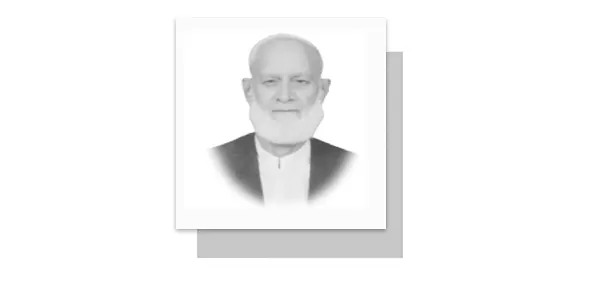Bureaucracy can change fate and future of Pakistan
COMMENDABLE efforts for the improvement of functions and performance of the Capital Development Authority (CDA), a formidable institution of the Government, by its present Chairman, Captain (Retd) Noor-Ul-Amin Mengal, are underway. On the other hand, similar struggle continues by the Director General Military Land and Cantonments, Major General Tariq Zameer. Both the authorities have generated an impact and a glimpse of hope of development-oriented activities by important departments of the government. This is a manifestation of the fact that if bureaucracy is provided proper guidance, vision and opportunity, the hard working and talented officers in the bureaucracy are capable enough to make a tangible contribution to our dwindling economy. Of course, the said organizations have ample resources to achieve their targets. The only issue in civil services is lack of due enforcement of the merit system in all spheres of civil service and social structure.
The advanced countries of the world accord top priority to merit system as is evident from the examples of Muhammad Sadiq Khan, Lord Mayor of London. Mr. Rishi Sunak is the British Prime Minister. A lady from foreign origin is the Vice President of a superpower – the United States of America. The merit system prevails irrespective of caste, creed and colour. The CDA Chairman decided to establish 100 recharge wells and 20 monitoring stations to counter the reduction in ground water level and to curtail urban flooding by Nullah Leh flowing in twin cities, and causing havoc every year. Out of 100 proposed recharge wells 50 have been accomplished with conservation capacity of 10 million gallons of water which at first replenished the ground water level and secondly reduced urban flooding by Nullah Leh in 2022. This is a great achievement and a matter of satisfaction for the citizens of twin-cities.
Now the CDA Chairman has further decided to introduce rain water harvesting and setting up a Building Housing Control Wing to regulate functions of housing projects in the capital territory, especially managing usefully the resource of rain water available in their respective domain. The Directorate of Military Land and Cantonments has also exhibited the deep interest in building water reservoirs. A tank of water has been completed with a capacity of 50,000 gallons of water as a first step in this direction. The DG has forcefully directed his subordinate establishments to undertake projects of water conservation in their catchment areas to cater to the requirement of water for vegetation and vegetable, besides, other by-products, being a multiple purpose enterprise.
As such, positive initiatives of these important institutions with sufficient expertise could usher in a better future. Both the departments are vested with prestige and status and are, therefore, vulnerable to transfer of the incumbents. The continuity of administrative policies fosters confidence and paves way for accomplishment of public-oriented projects. It may be mentioned here that the writer made relentless efforts by his several articles on the subject published in prominent English dailies including the Pakistan Observer, a premier and prestigious newspaper of Pakistan, to persuade the government and its functionaries to realize the importance of rain water for our survival. The response is encouraging.
The bureaucrats with integrity and talent are recorded in the annals of bureaucracy. In the history of Pakistan, some bureaucrats rose to the climax positions of the country with a legacy of enviable reputation for their generations. The towering bureaucrats in Pakistan and AJK can be narrated as a tribute to their meritorious services rendered to the nation. Chaudhry Muhammad Ali rose to the portfolio of Prime Minister of Pakistan. The second bureaucrat, held in high esteem is Ghulam Ishaq Khan who became the President of Islamic Republic of Pakistan. He left an institution of International fame and an asset for KPK government, known as Ghulam Ishaq Khan Institute of Science and Technology. Qudratullah Shahab, a Chief Secretary of AJK, and author of “Shahab Nama” which has made him immortal. This book explains the personality of the officer. Abdul Bari, Chief Secretary of AJK was offered historic and emotional sendoff on his transfer from AJK up to Kohala for his admirable services for the settlement of refugees. Syed Safdar Hussain Kazmi, Chief Secretary of AJK who was inspiration and guide for the writer in the formulation and enforcement of AJK Rules of Business 1985, and departmental rules for all the departments.
The AJK local bureaucracy also produced officers of high calibre and integrity who made commendable sacrifices and rendered valuable services for AJK. Abdul Aziz Salaria, an educationist, migrated from Jammu, retired as founder Vice Chancellor of AJK University and was also a journalist. Another famous bureaucrat Muhammad Yousaf Awan, an engineer, retired as Additional Chief Secretary and was known for integrity and righteousness. Khalil Ahmed Qureshi initiated the process of compiling AJK state laws while he held the position of Law Secretary. He compiled the code of revenue laws and rules as a senior member, Board of Revenue. He also got prepared the calendar for AJK University while he held the post of Vice Chancellor.
—The writer is Retired Additional Chief Secretary and Advocate Supreme Court of AJK.
Email: kishwer72@gmail.com










